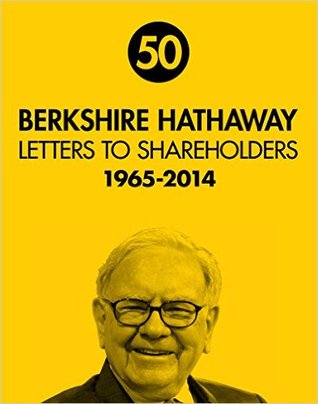More on this book
Community
Kindle Notes & Highlights
Read between
May 21 - November 17, 2018
When CEOs or investment bankers tout pre-depreciation figures such as EBITDA as a valuation guide, watch their noses lengthen while they speak.
It’s easy to look back over the 115-year span and realize how extraordinarily beneficial agricultural innovations have been — not just for farmers but, more broadly, for our entire society. We would not have anything close to the America we now know had we stifled those improvements in productivity. (It was fortunate that horses couldn’t vote.)
(Though the early bird gets the worm, the second mouse gets the cheese.)
In its electric utility business, our Berkshire Hathaway Energy (“BHE”) operates within a changing economic model. Historically, the survival of a local electric company did not depend on its efficiency. In fact, a “sloppy” operation could do just fine financially. That’s because utilities were usually the sole supplier of a needed product and were allowed to price at a level that gave them a prescribed return upon the capital they employed. The joke in the industry was that a utility was the only business that would automatically earn more money by redecorating the boss’s office. And some
...more
Much of what you become in life depends on whom you choose to admire and copy.
Specifically, the accounting for businesses we own requires that the carrying value of “losers” be written down when their failures become apparent. “Winners,” conversely, are never revalued upwards.
As Gertrude Stein put it, “Money is always there, but the pockets change.”
Meg McConnell of the New York Fed aptly described the reality of panics: “We spend a lot of time looking for systemic risk; in truth, however, it tends to find us.”
During such scary periods, you should never forget two things: First, widespread fear is your friend as an investor, because it serves up bargain purchases. Second, personal fear is your enemy. It will also be unwarranted. Investors who avoid high and unnecessary costs and simply sit for an extended period with a collection of large, conservatively-financed American businesses will almost certainly do well.
So how does our float affect intrinsic value? When Berkshire’s book value is calculated, the full amount of our float is deducted as a liability, just as if we had to pay it out tomorrow and could not replenish it. But to think of float as a typical liability is a major mistake. It should instead be viewed as a revolving fund. Daily, we pay old claims and related expenses — a huge $27 billion to more than six million claimants in 2016 — and that reduces float. Just as surely, we each day write new business that will soon generate its own claims, adding to float. If our revolving float is both
...more
At bottom, a sound insurance operation needs to adhere to four disciplines. It must (1) understand all exposures that might cause a policy to incur losses; (2) conservatively assess the likelihood of any exposure actually causing a loss and the probable cost if it does; (3) set a premium that, on average, will deliver a profit after both prospective loss costs and operating expenses are covered; and (4) be willing to walk away if the appropriate premium can’t be obtained.
That old line, “The other guy is doing it, so we must as well,” spells trouble in any business, but in none more so than insurance.
But a management that regularly attempts to wave away very real costs by highlighting “adjusted per-share earnings” makes us nervous. That’s because bad behavior is contagious: CEOs who overtly look for ways to report high numbers tend to foster a culture in which subordinates strive to be “helpful” as well. Goals like that can lead, for example, to insurers underestimating their loss reserves, a practice that has destroyed many industry participants.
In truth, business is too unpredictable for the numbers always to be met. Inevitably, surprises occur. When they do, a CEO whose focus is centered on Wall Street will be tempted to make up the numbers.
The bottom line: When trillions of dollars are managed by Wall Streeters charging high fees, it will usually be the managers who reap outsized profits, not the clients. Both large and small investors should stick with low-cost index funds.
The likely result from this parade of promises is predicted in an adage: “When a person with money meets a person with experience, the one with experience ends up with the money and the one with money leaves with experience.”
the investor of today does not profit from yesterday’s growth.
Any thought that 70% of the environment is going to substantially out-perform the total environment is analogous to the fellow sitting down with his friends at the poker table and announcing: “Well, fellows, if we all play carefully tonight, we all should be able to win a little.”[†]
What should you be doing in running your business? Just what you always do: Widen the moat, build enduring competitive advantage, delight your customers, and relentlessly fight costs. With the exception of insurance pricing and coverages, almost all operating decisions that made sense a month ago make sense today.


